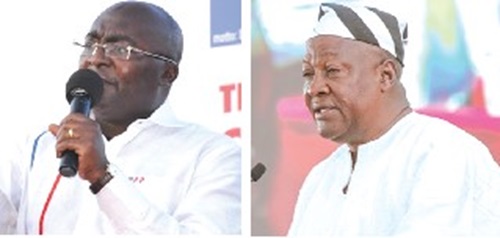
Ahead of the NDC, NPP manifestos launch: Matters arising
As we anticipate the National Democratic Congress (NDC) and New Patriotic Party (NPP) manifestos launch, we expect all political parties to identify and address issues of utmost importance to the nation.
First, it’s important to remember that in Ghana, food security is a critical issue and as such, strategies for ensuring food security and agricultural development are likely to be key components of party manifestos.
In 2022, Ghana imported approximately $2.6 billion worth of agricultural produce and its related products. This figure is expected to rise due to the underdeveloped state of Ghana’s food processing sector, which is currently unable to meet increasing demands.
Ghana’s major food imports include rice, wheat, soybean meal, poultry and tripe (yemuadie), with over 55 per cent of Ghana’s rice consumption being imported, along with many other staple foods.
Balancing the need to boost local food production, while implementing import restrictions to achieve food security, should be a significant focus within party manifestos.
Achieving self-sufficiency in food production has the potential to create jobs and reduce the pressure on Ghana’s exchange rates. Table 1 below provides a breakdown of Ghana’s expenditure on agricultural produce and its related imports (2018-2022).
Additionally, addressing the issue of food imports is crucial for public health, as many imported food products are of substandard quality.
Economy
Second, Ghana’s economic landscape is poised to become a primary focal point in the upcoming elections. Despite Ghana’s democratic achievements, the economic progress appears relatively bad.
The African Development Bank’s Ghana Economic Outlook paints a rather bleak picture, citing a deceleration in real GDP growth from 3.8 per cent in 2022 to 2.9 per cent in 2023.
Inflation worsened from 31.5 per cent in 2022 to 40.3 per cent in 2023, primarily driven by escalating food prices and currency depreciation. Moreover, gross international reserves contracted from $6.3 billion (equivalent to 2.7 months of import cover) at the close of 2022 to $5.0 billion (equivalent to 2.3 months) in November 2023.
Nonetheless, there are some positive aspects to be noted. The pace of exchange rate depreciation moderated from 60 per cent in 2022 to 17 per cent in 2023.
Additionally, the fiscal deficit narrowed from 11.8 per cent of GDP in 2022 to 4.5 per cent in 2023 owing to fiscal consolidation and improved revenue performance.
Public debt also decreased from 92.4 per cent of GDP in 2022 to 84.9 per cent in 2023, reflecting the advantages of the Domestic Debt Exchange Programme.
These figures are likely to deteriorate in an election year if fiscal discipline is not pursued.
The impending manifestos are anticipated to delineate policies targeted at bolstering real GDP growth and gross international reserves, while curtailing inflation, among other pertinent objectives.
Unemployment
Third, Ghana’s unemployment rate remains troublingly high, estimated at four per cent (Table 2 shows unemployment rates from 2014-2024).
The unemployed population primarily comprises youth between the ages of 18 and 35, presenting a significant security challenge in light of the delicate political situation in the West-African sub region.
Consequently, both parties are expected to present actionable strategies to enhance job creation and significantly reduce unemployment.
Corruption
Fourth, anti-corruption strategy is expected to feature prominently in party manifestos. According to the Ghana Integrity Initiative 2019 report, Ghana loses about US$3 billion due to corruption annually, a figure equivalent to the three-year Extended Credit Facility Ghana is receiving from the IMF.
Corruption thrives on opaqueness, therefore to combat corruption, transparency and accountability are essential. Political parties are expected to devise effective strategies to enhance transparency in governance and strengthen state institutions.
Additionally, measures should be developed to bolster anti-corruption agencies and improve the public procurement laws and assets declaration regimes. Party manifestos are expected to support legislation related to unexplained wealth and impose stringent penalties on individuals convicted of corruption.
Furthermore, to effectively address corruption, political parties should focus on tackling the high costs of campaign financing. According to the Ghana Centre for Democratic Development, winning the Parliamentary and Presidential elections requires over GH¢4 million and $100 million, respectively, for the two parties.
The critical question to consider is how the President and Members of Parliament (MPs) will manage to settle these campaign costs within their four-year tenure considering their official salaries. Unless the issue of campaign financing is addressed, Ghana is unlikely to make significant progress in combating corruption.
Health
Fifth, Ghana’s healthcare sector faces many challenges, including insufficient bed capacity, a shortage of healthcare professionals, inadequate health infrastructure and an ineffective health insurance system.
Additionally, the emigration of healthcare workers worsens these challenges. To address these, party manifestos must address the ‘no-bed syndrome’ by enhancing the availability of hospital beds in various healthcare facilities.
Presently, Ghana’s ratio of hospital beds to population is 18 per cent, which falls short of the World Health Organisation’s recommended standard of five beds per 1,000 individuals.
Party manifestos should support improvements in healthcare infrastructure nationwide to facilitate healthcare delivery and healthcare access by improving Ghana’s road network.
Addressing the current doctor-to-patient ratio of 1:10,450 by striving to meet 50 per cent of the global standard of 1:1,000 by 2030 necessitates incentivising healthcare workers to stem the exodus from Ghana and attract diaspora professionals.
Also, reforming the health insurance system to enhance its effectiveness in providing coverage to citizens and ensuring timely payments to healthcare providers is crucial.
Gender equality
Finally, we expect party manifestos to propose strategies to implement the newly passed Affirmative Action (Gender Equality) Act 2024.
While party manifestos are not legally binding, the media plays a pivotal role in holding parties accountable for their manifesto commitments. Finally, citizens’ demand for accountability and their determination to reward/sanction political actors based on their responsiveness to citizens’ needs are vital in ensuring that political actors uphold their manifestos pledges.
The writer is a Political Scientist
